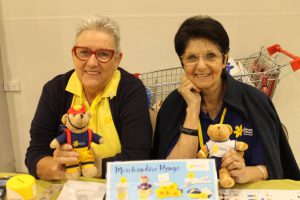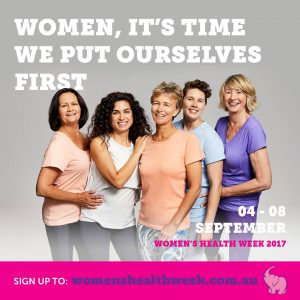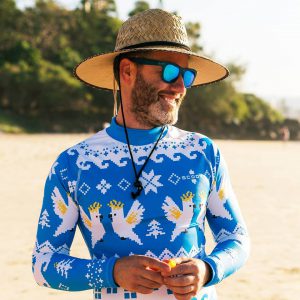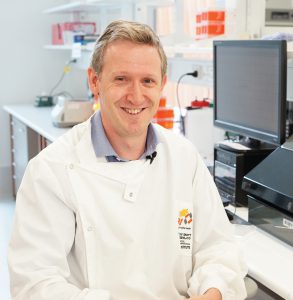On this page you will find information on:
Thank you for your support this Daffodil Day

Thank you to everyone who volunteered for Daffodil Day on August 25. Your help made the day a huge success!
2000 volunteers across Queensland turned out to staff our stalls and paint the state yellow to provide hope for all Queenslanders affected by cancer.
With your support, we are well on our way to reaching our goal of $1 million to help continue our work in cancer research, prevention and support services.

Women’s Health Week
Held earlier this month, September 4-8, Women’s Health Week provides the opportunity to promote positive lifestyle changes women can make to improve their health and wellbeing.
When it comes to health, many women are great at caring for others but often put themselves last, citing ‘lack of time’ and ‘health not being a priority’ as the biggest barriers to maintaining a healthy lifestyle.
Throughout the week, women across Australia had the opportunity to learn more about their health and discuss issues they might usually avoid. Free events, articles, videos, recipes and much more were made available to help make women’s health a priority.
Every day in Queensland 12 women are diagnosed with a breast or gynaecological cancer and two die from the disease. Despite this, many women are not aware of the steps they can take to improve their health daily and try to prevent cancer.
Now in its fifth year, Women’s Health Week is the time for women to put themselves first and get talking about their health. We encourage you to take the time to engage in meaningful conversations about health with the women in your life to help encourage the improvement of future health outcomes for Queensland women.
Wish you could wear an Ugly Xmas Sweater?
 We’ve got you covered this summer with an Aussie alternative.
We’ve got you covered this summer with an Aussie alternative.
Introducing our brand NEW true-blue cockatoo Ugly Xmas Rashie for 2017!
Pre-order one for yourself, and a friend, at www.uglyxmasrashie.com.au and get festive in style.
Each rashie sold raises funds for Australians affected by cancer.

Queensland researchers discover cancer kill switch for breast cancer subtype
Women with particular sub-types of breast cancer have been given new hope, thanks to a discovery by Queensland researchers identifying a new way to kill certain types of cancer cells.
Funded by Cancer Council Queensland, a University of Queensland study published in the international journal Oncogene has found that some women with breast cancer could benefit from a new targeted treatment that could kill cancer cells.
Cancer Council Queensland CEO Ms Chris McMillan said the breakthrough was promising and had the potential to save lives
Read the full article
Get the girls together this October

Join together with your favourite ladies to host or attend a Girls’ Night In this October and help raise money to support the estimated 4180 Queensland women who will be diagnosed with breast or gynaecological cancer this year.
Getting involved is easy. Simply invite the girls over for a fun night and ask them to donate what they would usually spend on a night out.
All money raised will help Cancer Council fight women’s cancers through prevention programs, support services and research.
Visit girlsnightin.com.au to register or find an event, donate, or to find inspiration for your Girls’ Night In.
How your money helps
- $5 Can produce a meditation DVD to help women deal with the impact of a cancer diagnosis and treatment.
- $10 Can help pay for an Information Pack to help a woman cope after surgery.
- $50 Can help fund a call to a Cancer Council’s 13 11 20, that informs and supports a woman through her cancer diagnosis.
- $100 Can help provide accommodation for a woman who needs to travel and stay away from home to access treatment.
- $500 Can cover some of the costs of recruiting women into a studies to understand the causes of cancer.
- $1200 Can go towards supporting research into breast and gynaecological cancers.

Memory CD8+ T-cell function in squamous cell carcinoma
Principle Researcher:
Dr James Wells
Co-Chief Investigator:
Professor Ian Frazer
Project Location:
UQ Diamantina Institute
Translational Research Institute
Project Outline:
Organ transplant recipients endure a greatly increased risk of squamous cell carcinoma (SCC) development as a consequence of immunosuppressive drugs prescribed to prevent organ rejection. Studies of clinical records in Queensland show that up to 80 per cent of organ transplant recipients can expect to develop some kind of skin cancer within 20 years. Many of these patients will develop multiple cancers, which are known to occur more frequently and grow more aggressively as a result of the immunosuppressive drugs that these patients receive.
At present these patients have few options: they can stop taking the drugs, which will result in the loss of their transplanted organs, or they can keep taking the drugs and maintain their transplanted organs but endure a high burden of aggressive skin cancers.
Over the next two years we plan to examine the clinical observation that some drugs confer less of a skin cancer risk than others, in order to fully understand which immune mechanisms are responsible for the skin cancer risk associated with immunosuppressive drug use. We will examine whether some medications promote the function of a type of immune cell known as a memory CD8+ T-cell within SCC. To do this we will use an innovative new automated quantitative pathology imaging platform that
will allow us to quantify CD8 T-cell subsets and associated effector cytokine release in situ.
Our short term outcome is to understand the immune mechanisms that prevent skin cancer formation by examining the impact of different immunosuppressive drugs on skin cancer formation. Our findings will have fundamental implications for our understanding of how to prevent skin cancer development while at the same time preventing organ rejection.
Project Goals:
- To examine how two drugs (tacrolimus and rapamycin) differentially affect the function of memory CD8+ T-cell within SCC.
- To determine whether rapamycin affects the expression of immune-inhibitory molecules within SCC.
- To define the role of memory CD8+ T-cells as key effectors of SCC regression.
